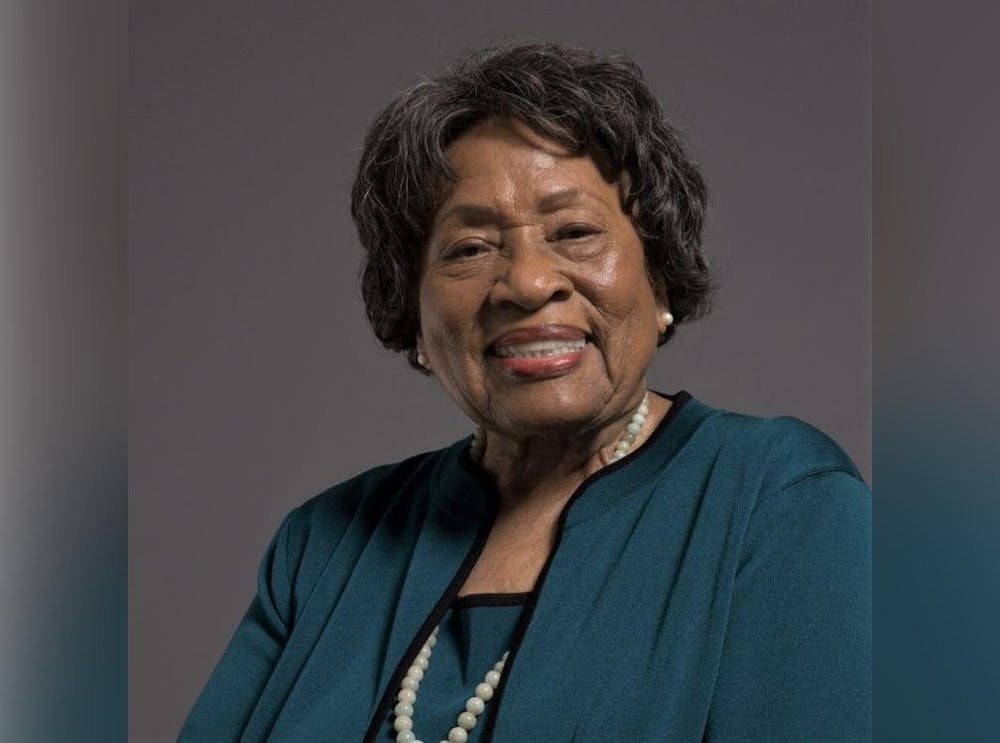Dr. Joycelyn Elders, former U.S. surgeon general and currently a professor at the University of Arkansas, was presented Thursday with the 2020 Ryan White Distinguished Leadership Award by the IU School of Public Health and the Rural Center for AIDS/STD Prevention.
Elders, who served as surgeon general from 1993 to 1994, was the second woman, second person of color and the first Black woman to be in the position. She has done a lot of work in sexual education and health care and taken a positive stances on issues such as masturbation as a means of practicing safe sexual behavior and HIV/AIDS advocacy. She’s received numerous awards and honors throughout the years along with tonight’s award.
"They don't expect a Black female to have accomplished what I have and to have done the things I have," she is quoted in saying in the program for the night's event.
The award, first given in 2009, honors people who have made significant achievements in HIV/AIDS prevention nationally and internationally. Ryan White was a boy who was diagnosed with AIDS at 13 after receiving tainted blood products for hemophilia in 1984. He went on to gain national recognition as a spokesperson for HIV and AIDS advocacy, appearing at schools and fundraisers across the country and meeting with important national figures before his death in 1990. He was just 19, and died a few months before he would haveenrolled at IU.
Jeanne White Ginder, Ryan’s mother and the 2009 recipient, spoke of Ryan at the event.
“All I ever wanted to be was a mom,” Ginder said. “My life changed overnight.”
Ginder spoke about dealing with her son’s diagnosis, saying fellow advocate Elton John was “always by our side” and was with the family during the last week and a half of Ryan’s life. She spoke of going to Washington, D.C., to meet with senators to help pass the CARES Act, saying that while she never expected to become an advocate, she feels blessed to continue Ryan’s legacy.
Lem Watson, IU associate vice president for Diversity, Equity and Multicultural Affairs, spoke about the importance of diversity equity and inclusion at IU and recognizing Elders’ ability to break down barriers as a Black woman.
William Yarber, IU professor of applied health science and founder of the Rural Center for AIDS/STD Prevention, said while the HIV/AIDS crisis has long been ongoing, especially within the deep south. He lamented how HIV and drug use have affected Indiana.
The night concluded with the presentation of the award to Elders and her giving a speech about her time as surgeon general. She began by thanking the White family for their work.
“He left a legacy of caring and hope for millions so we each could live and lead such a legacy,” she said.
She commented on the COVID-19 pandemic, comparing it to the massive HIV/AIDS outbreak. She said that much of what has been learned about HIV informs society about COVID-19.
On the topic of sexual health and education, she said its greatest barrier has historically been fear and stigma.
“We have a fear of sexual knowledge in society that buries its tentacles,” she said.
Elders stressed that because humans are “sexual beings,” complete abstinence should not be taught. She said the focus should instead be on proper condom use , also underscoring the importance of normalizing masturbation and not being ashamed of human sexuality.
Elders said much of the struggle to make meaningful change comes from the fear of making people angry, which inspires further oppression.
“We say ‘the oppressed can swallow their anger,’ because that’s what they’re accustomed to doing,” Elders said. “What we get from keeping our mouths shut is what we have now: a system that is not equitable.”
But despite the hardships, Elders has faith that change will come. She hopes society will work toward better health care and increased awareness and “expand our care boundaries to all” in order to keep other families from going through what Ryan’s did.
“We can only travel forward in time,” she said. “We’re only as healthy as the least healthy American. We’re all in the same boat.”




